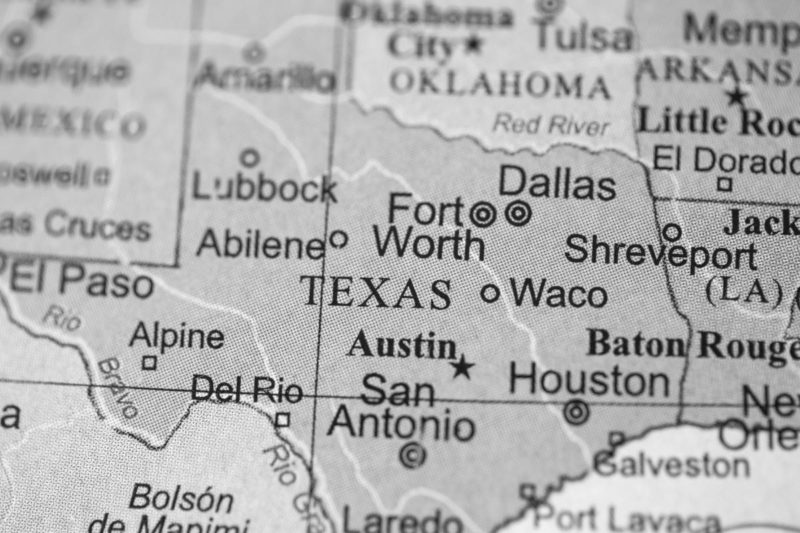For-Profit Texas Prisons Could Reduce Standards for Holding Children
The reason family detention centers must become licensed child-care facilities in order to continue operating is a fight that originated in Texas.

The Texas Health and Human Services Commission approved a proposed rule Friday to reduce child-care standards, permitting two for-profit detention centers detaining hundreds of children in the state to move forward with the licensing process.
Grassroots Leadership, the Texas-based organization that won a temporary injunction in November in its suit to stop the Texas Department of Family and Protective Services (DFPS) from licensing Karnes County Residential Center and Dilley’s South Texas Family Residential Center as child-care facilities under an emergency rule, said in a press release that Friday’s ruling could set a dangerous precedent.
The emergency rule would have eliminated minimum child safety standards applicable to all child-care facilities in Texas. Because Grassroots Leadership received the temporary injunction, Karnes and Dilley were forced to go through the traditional licensing procedure, which enabled immigrant rights organizers, child welfare advocates, academic researchers, and immigrant families released from detention centers to attend December’s public hearing at DFPS and comment on the proposal to license the family detention centers as child-care facilities.
An open records request obtained by Grassroots Leadership found that DFPS received more than 5,000 pages filled with comments, letters, emails, and testimony that were “overwhelmingly against” adopting the proposed rule.
The department’s decision came on the heels of Pennsylvania, the only other state in the country with family detention centers, issuing notice on January 25 that the licensing of the Berks County Family Residential Center would not be renewed and would officially be revoked, ending family detention in the state. The facility has appealed the decision.
Texas officials decided to move forward with this new licensing process that lowers the standards for child-care facilities in detention centers, Bob Libal, executive director of Grassroots Leadership, told Rewire.
“This is about ensuring that family detention can continue in the wake of the Flores ruling,” Libal said. “The agency essentially admitted that this is part of immigration enforcement, and not about child welfare.”
The Flores v. Meese agreement states that children should not be held in unlicensed facilities.
The reason family detention centers must become licensed child-care facilities in order to continue operating is also a fight that originated in Texas.
Judge Dolly M. Gee ordered in July that migrant children be released from family detention centers, as Rewire reported. Judge Gee said migrant children had been held in “widespread deplorable conditions” in Texas Border Patrol stations and that authorities had “wholly failed” to provide the “safe and sanitary” conditions required for children even in temporary cells.
These conditions were in violation of the Flores agreement. Texas’ DFPS in September began trying to keep the detention facilities open to house women and children by creating a new child-care licensing category for family detention centers. Friday’s ruling means that on March 1, the family detention centers can apply for licensing. Hearings will be held based on the facilities’ applications, allowing the public to weigh in again.
Libal said DFPS ignored the testimony from child welfare experts and has chosen to move ahead “simply in order to bolster this harsh immigration detention policy and allow private prison corporations that are reliant on immigration detention contracts, including the ones at Karnes and Dilley, to continue to profit.”
Libal is referring to companies like Corrections Corporation of America (CCA), a for-profit, private prison company with a history of allegations of human rights abuses in its prisons and detention facilities, including claims of child abuse. CCA runs Dilley’s South Texas Family Residential Center.
“If you look at the recent CCA’s shareholder call, it is very clear that any profits from 2014 and 2015 were due to Dilley. For me, the ruling moving us closer to seeing these prisons licensed as child-care facilities wasn’t necessarily surprising, but it is shameful that the agency has abdicated on its responsibilities to children in Texas in the pursuit of a harsh immigration enforcement policy,” Libal said.
Though the facilities don’t yet have licenses, Libal said the overarching concern is that the ruling means these detention centers will continue to stay open.
“When it comes to family detention, this fight is far from over at both the state and federal level,” Libal said. “At the Democratic debate last week, both Secretary Clinton and Senator Sanders said they would end family detention. For me, this is about what the Obama Administration’s legacy will be and about what the next president will inherit, which is the largest trend in family detention since interment. I certainly hope President Obama will choose to end family detention before leaving office.”
